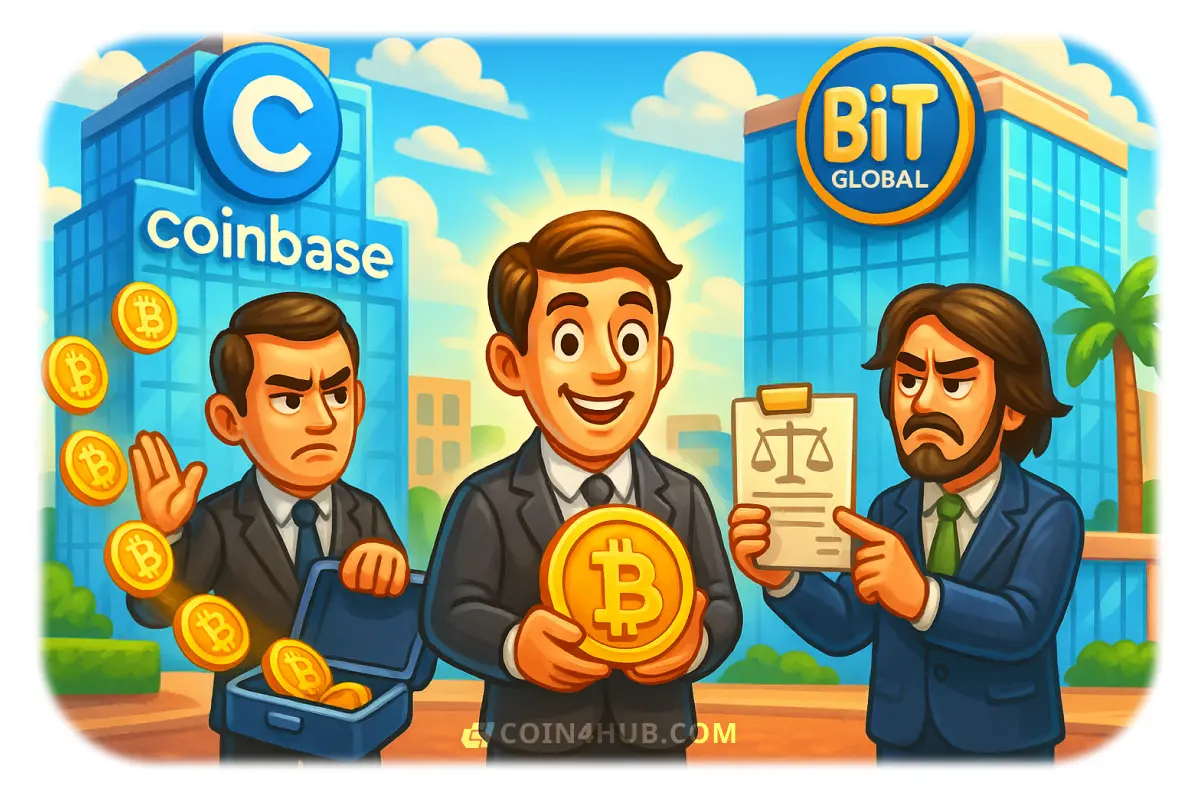Table of Contents
In a significant development for the cryptocurrency industry, BiT Global has officially ended its legal battle with Coinbase over the controversial delisting of wrapped bitcoin (WBTC). The resolution marks the conclusion of a contentious period that highlighted the complex relationship between exchanges, token issuers, and influential figures in the crypto space.
According to court documents filed jointly by both parties, BiT Global has agreed to dismiss its lawsuit with prejudice, effectively closing the door on any future litigation regarding this specific matter. This decision comes after months of legal maneuvering that began when Coinbase removed WBTC from its platform citing concerns about Justin Sun’s involvement with the token.
Understanding the WBTC Delisting Controversy
The dispute began last year when Coinbase, one of the largest cryptocurrency exchanges in the world, made the decision to delist BiT Global’s wrapped bitcoin token. At the heart of the controversy was Coinbase’s expressed concern about what it termed an “unacceptable risk” that the tokenized bitcoin could “fall into the hands of Justin Sun,” a prominent and sometimes controversial figure in the cryptocurrency industry.
The relationship between Sun and WBTC formalized in August of last year through a strategic partnership. This development prompted Coinbase to question BiT Global about Sun’s specific role and influence over the token’s governance and operations. The exchange ultimately decided to remove the token from its platform, citing regulatory and risk management concerns.
Justin Sun, the Chinese-born crypto entrepreneur known for founding TRON and acquiring BitTorrent, has been a polarizing figure in the industry. Despite Coinbase’s concerns, Sun continued to publicly support WBTC, even influencing World Liberty Financial to adopt WBTC in place of its own tokenized bitcoin product after he joined the organization as an advisor.

The Legal Challenge by BiT Global
BiT Global’s lawsuit, filed in the Northern District of California, alleged that Coinbase’s decision to delist WBTC was unjustified and potentially self-serving. The legal action claimed that the removal damaged the token’s liquidity and reputation in the marketplace, creating a significant barrier to its adoption and use.
A central element of BiT Global’s argument was the timing of Coinbase’s decision. The exchange had launched its own competing wrapped bitcoin product, cbBTC, just two months before announcing the delisting of WBTC. BiT Global suggested this timing indicated potential anti-competitive behavior, with Coinbase potentially using its market position to favor its own product at the expense of competitors.
The case raised important questions about the power of centralized exchanges to influence token ecosystems and the responsibilities they bear when making listing and delisting decisions that can significantly impact projects and investors.
Timeline of the WBTC-Coinbase Dispute
| Date | Event | Significance |
|---|---|---|
| August 2024 | Justin Sun partners with BiT Global’s WBTC | Established Sun’s formal association with the token |
| Late 2024 | Coinbase launches cbBTC | Introduces competing wrapped Bitcoin product |
| Two months after cbBTC launch | Coinbase announces WBTC delisting | Cites concerns about Justin Sun’s involvement |
| Late 2024 | BiT Global files lawsuit | Claims unjustified delisting and anti-competitive behavior |
| June 7, 2025 | Case dismissed with prejudice | Legal dispute officially concludes |
The Resolution and Its Implications
The joint court filing indicates that both Coinbase and BiT Global have agreed to cover their own legal expenses, a common arrangement in dismissed cases. Importantly, the dismissal with prejudice means that BiT Global cannot refile the same claims in the future, providing Coinbase with permanent closure on this specific legal challenge.
It’s worth noting that the court documents specifically clarify that the dismissal does not constitute a formal settlement agreement. No additional terms or conditions have been disclosed beyond the cost arrangements, leaving industry observers to speculate about any potential private agreements between the parties.
The resolution of this case has several important implications for the cryptocurrency industry:
- Exchange Authority: The case highlighted the significant power centralized exchanges wield over token projects through their listing and delisting decisions.
- Competitive Dynamics: Questions about whether exchanges should be able to list their own competing products while making decisions about similar third-party offerings remain unresolved.
- Influence of Individuals: The role of high-profile individuals like Justin Sun in determining the risk profile of tokens raises important questions about decentralization and governance.
- Disclosure Standards: The case underscores the importance of clear communication and transparency when exchanges make decisions that significantly impact listed assets.
Justin Sun’s Controversial Role in Crypto
To fully understand the context of Coinbase’s concerns, it’s important to examine Justin Sun’s complex position in the cryptocurrency ecosystem. As the founder of TRON and CEO of BitTorrent, Sun has built a substantial business empire in the digital asset space. However, his aggressive marketing tactics and business practices have sometimes drawn criticism from industry participants and regulators alike.
Sun’s influence extends across multiple projects and platforms, and his approach to promotion and partnerships has occasionally raised eyebrows in regulatory circles. Coinbase’s specific concern about WBTC “falling into the hands” of Sun suggests the exchange may have been worried about regulatory scrutiny or compliance issues that could arise from association with Sun-affiliated projects.
Despite these concerns, Sun’s ability to drive adoption remains significant. His advisory role with World Liberty Financial led to that organization adopting WBTC over alternative wrapped bitcoin implementations, demonstrating his continued influence within the industry even as some established players seek to distance themselves from his projects.
The Growing Market for Wrapped Bitcoin
The dispute between Coinbase and BiT Global highlights the growing importance and competitiveness of the wrapped bitcoin market. Wrapped bitcoin tokens like WBTC and cbBTC serve a crucial function in the cryptocurrency ecosystem, allowing bitcoin holders to effectively use their bitcoin value on Ethereum and other smart contract platforms.
These tokens essentially bridge the bitcoin blockchain with the Ethereum ecosystem, enabling bitcoin to be used in decentralized finance (DeFi) applications, yield farming, and other Ethereum-based services. As the DeFi sector has expanded dramatically in recent years, the demand for wrapped bitcoin has similarly grown, making it an increasingly valuable market segment.
Coinbase’s launch of cbBTC represented the exchange’s strategic move to capture market share in this growing sector. By offering its own wrapped bitcoin product, Coinbase could potentially generate additional revenue through issuance and redemption fees while retaining user activity within its ecosystem.
The current landscape of wrapped bitcoin includes several major offerings:
- WBTC (Wrapped Bitcoin): The token at the center of this dispute, managed by BiT Global and now associated with Justin Sun.
- cbBTC (Coinbase Wrapped Bitcoin): Coinbase’s proprietary wrapped bitcoin solution, launched shortly before the WBTC delisting decision.
- renBTC: Another significant wrapped bitcoin implementation focusing on decentralization.
- hBTC: Huobi’s wrapped bitcoin token, popular in Asian markets.
- sBTC: A synthetic bitcoin token used in various DeFi protocols.
Each of these implementations has different characteristics regarding custody arrangements, governance, and technical implementation, leading to competition for market share based on security, transparency, and usability factors.
Regulatory Implications of the Case
The Coinbase-BiT Global dispute takes place against a backdrop of increasing regulatory scrutiny of cryptocurrency exchanges and token issuers. Exchanges like Coinbase, particularly those publicly traded and regulated in the United States, face significant pressure to ensure compliance with evolving regulatory standards.
Coinbase’s decision to delist WBTC based on concerns about Justin Sun’s involvement suggests the exchange may have been responding to perceived regulatory risks. Associations with controversial figures or projects can potentially trigger additional regulatory scrutiny or enforcement actions, which publicly traded exchanges are especially motivated to avoid.
The resolution of this case without public disclosure of terms leaves open questions about how exchanges should balance their own business interests, regulatory compliance concerns, and their responsibility to token projects and investors who may be harmed by sudden delisting decisions.
This case may influence how regulatory bodies view the obligations of exchanges when making listing and delisting decisions, potentially leading to calls for more standardized processes and disclosure requirements around such actions.
Impact on Investor Confidence and Market Liquidity
One of the central claims in BiT Global’s lawsuit was that Coinbase’s delisting decision harmed WBTC’s liquidity and reputation. Delisting from a major exchange like Coinbase typically results in reduced trading volume and access for the affected token, potentially leading to price declines and reduced utility.
For investors holding WBTC at the time of delisting, the decision may have caused financial losses and uncertainty about the token’s future viability. The lawsuit highlighted the potential for exchange decisions to have significant market impacts beyond simply determining which assets are available on a particular platform.
The resolution of this case without public disclosure of any remedial measures leaves open questions about whether affected WBTC investors received any compensation or consideration for potential losses resulting from the delisting decision.
More broadly, the case underscores the importance of exchanges communicating clearly and providing reasonable notice about delisting decisions to minimize market disruption and allow investors to make informed decisions about their holdings.
Future of Exchange-Token Issuer Relations
The conclusion of this legal battle may influence how exchanges and token projects approach their relationships in the future. Several potential developments could emerge:
- More Detailed Listing Agreements: Exchanges and token issuers may develop more comprehensive listing agreements that clearly outline the conditions under which tokens can be delisted and the process that must be followed.
- Increased Transparency Requirements: Token projects may face greater pressure to disclose partnerships, governance changes, and the involvement of high-profile individuals that could potentially trigger compliance concerns.
- Alternative Trading Venues: The risk of delisting from major centralized exchanges may accelerate the development and adoption of decentralized exchanges and liquidity solutions that are less vulnerable to single-party decisions.
- Industry Standards: The cryptocurrency industry may work toward developing more standardized practices around listing and delisting decisions to provide greater predictability and fairness for all participants.
These developments could ultimately lead to a more mature and stable cryptocurrency market with clearer expectations and protections for both token issuers and investors.
Key Takeaways from the Coinbase-BiT Global Resolution
As the dust settles on this significant industry dispute, several important takeaways emerge:
- The dismissal with prejudice provides final resolution to the specific legal claims between Coinbase and BiT Global regarding the WBTC delisting.
- Both companies will cover their own legal expenses, with no public disclosure of any additional terms or compensation arrangements.
- The timing of Coinbase’s delisting decision shortly after launching its competing product raised important questions about potential conflicts of interest in the exchange business model.
- Justin Sun’s influence continues to be a factor in how some institutional players in the cryptocurrency space evaluate their partnerships and associations.
- The wrapped bitcoin market remains highly competitive, with multiple implementations vying for market share and integration with the broader DeFi ecosystem.
- Questions about exchange responsibilities and the impact of delisting decisions on investors remain largely unresolved from a regulatory and industry standards perspective.
Conclusion: Moving Forward After the Dispute
The resolution of the legal battle between Coinbase and BiT Global represents an important moment for the cryptocurrency industry as it continues to mature and establish norms around the relationships between exchanges, token issuers, and influential individuals. While the specific dispute has concluded, the underlying issues it raised about exchange power, competitive dynamics, and the influence of high-profile individuals will continue to shape the evolution of the cryptocurrency ecosystem.
For investors and market participants, this case serves as a reminder of the still-developing nature of crypto markets and the importance of diversification across trading venues and custody solutions to mitigate risks associated with exchange decisions.
As the industry continues to grow and attract mainstream adoption, clearer standards and practices around token listings, delistings, and exchange governance will likely emerge, providing greater stability and predictability for all participants in the cryptocurrency ecosystem.
The Coinbase-BiT Global dispute may ultimately be remembered as an important step in this maturation process, highlighting challenges that needed to be addressed for the industry to reach its full potential.
FAQ: Understanding the Coinbase-BiT Global WBTC Dispute
Why did Coinbase delist BiT Global’s WBTC token?
Coinbase cited concerns about an “unacceptable risk” that the WBTC token could “fall into the hands of Justin Sun” following Sun’s partnership with BiT Global in August 2024. The exchange expressed regulatory and compliance concerns about Sun’s involvement with the token, leading to the delisting decision.
What was BiT Global’s claim against Coinbase in the lawsuit?
BiT Global alleged that Coinbase’s delisting decision was unjustified and harmed the token’s liquidity and reputation. The lawsuit also suggested potential anti-competitive behavior since Coinbase had launched its competing cbBTC product just two months before the delisting announcement.
What does dismissal “with prejudice” mean in this case?
Dismissal with prejudice means that BiT Global cannot file the same claims against Coinbase in the future regarding this specific WBTC delisting matter. It represents a final resolution of the legal dispute, though the court documents specify that it is not a formal settlement.
How do wrapped bitcoin tokens like WBTC and cbBTC work?
Wrapped bitcoin tokens are ERC-20 tokens on the Ethereum blockchain that are backed 1:1 by actual Bitcoin. They allow Bitcoin holders to effectively use their Bitcoin value within Ethereum’s ecosystem for activities like DeFi lending, borrowing, and yield farming. Each implementation (WBTC, cbBTC, etc.) has different custody arrangements and governance structures.
What implications does this case have for cryptocurrency exchanges and token issuers?
This case highlights the significant power exchanges hold through listing/delisting decisions, potential conflicts of interest when exchanges offer competing products, and the importance of transparency in exchange decision-making. It may lead to more detailed listing agreements, clearer delisting processes, and potentially new industry standards regarding exchange-token issuer relationships.
Source: CoinDesk
For more insights on cryptocurrency developments, regulations, and market trends, visit Coin4Hub for in-depth analysis and the latest news.


The resolution between Coinbase and BiT Global underscores the need for clearer regulatory frameworks and transparency in exchange operations to support investor confidence and market stability.
The settlement between Coinbase and BiT Global over the WBTC delisting highlights critical issues surrounding exchange influence and the need for transparent decision-making processes in the crypto sector.
This resolution highlights the growing complexity of relationships between crypto exchanges and token issuers, underscoring the critical need for transparency and regulation to maintain market integrity.
It’s interesting to see how influential figures like Justin Sun can sway significant decisions in the crypto space. The resolution of the dispute between Coinbase and BiT Global over WBTC, while leaving some questions unanswered, certainly underscores the complex dynamics of power, influence, and regulatory oversight in cryptocurrency markets.
The resolution between Coinbase and BiT Global underscores the intricate balance exchanges must maintain between competitive strategy and regulatory compliance, spotlighting the outsized influence individuals like Justin Sun can wield within the crypto space.